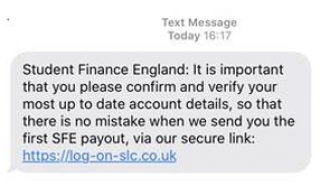Student Loans Company Text Scam
2 December 2020
The Student Loans Company have been made aware of a new text scam that is targeting students who receive their loans.

It is sadly becoming more common for fraudsters to target students with bogus emails and text messages around the 3 loan payment dates each year.
SLC have already been made aware of some students receiving the following scam text this year:

Spotting a phishing email or text isn’t always easy, but we have 5 fraud facts to help:
- Be suspicious of any requests for personal or financial information. SLC or Student Finance England (SFE) will never ask you to confirm your bank details, login information or personal financial information by email or text message.
- Phishing emails are often sent in bulk and are unlikely to contain both your first and last name. They commonly start, ‘Dear Student’ so be on guard if you see one like this.
- Check the quality of the communication. Misspelling, poor punctuation and bad grammar are often tell-tale signs of phishing.
- ‘Failure to respond in 24 hours will result in your account being closed’ - these types of messages are designed to convey a sense of urgency to prompt a quick response.
- Think before you click. If you receive an email or text message that contains a link that you’re not sure of then try hovering over it to check that it goes where it’s supposed to. If you’re still in any doubt don’t risk it, always go direct to the source rather than clicking on a potentially dangerous link.
Check out SLC's guide to identifying a phishing scam and phishing video on YouTube for more information.
Anyone who receives a suspicious email should send it to phishing@slc.co.uk. SLC can then investigate the site and ensure it is shut down to help protect other students.
Last revised: 8 September 2021
 Close
Close

